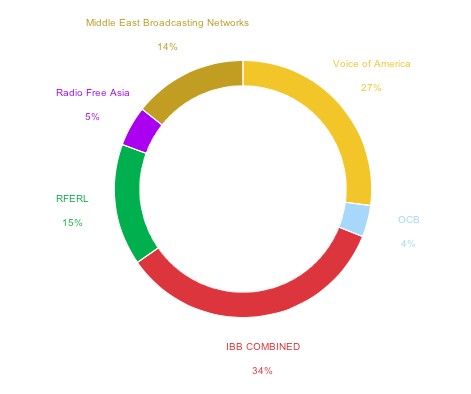BBG Watch EXCLUSIVE
BBG Watch has learned from reliable high-level sources within the Broadcasting Board of Governors (BBG) that John F. Lansing, former president and chief executive officer of Scripps Networks Interactive Inc., is a leading contender for the Chief Executive Officer post at the BBG. His front runner status was confirmed by other Washington sources with links to the federal agency in charge of U.S. media outreach abroad, but the BBG Board has not made any official announcements on the selection of new CEO.
Sources cautioned that due to cumbersome U.S. federal job selection procedures, there is no guarantee that any qualified candidate will be ultimately approved and will accept a high-level government position. If John Lansing gets the job and decides to take it, he will face a big challenge of reforming a deeply troubled federal agency which, nevertheless, has a critical international media mission in the era of hostile propaganda from Putin’s Russia and from other non-democratic countries, as well as from ISIS and other violent extremist groups.
Publicly-funded broadcasters within the BBG network include the Voice of America (VOA), Radio Free Europe/Radio Liberty (RFE/RL), the Middle East Broadcasting Networks (MBN – Alhurra TV and Radio Sawa), Radio Free Asia (RFA), and the Office of Cuba Broadcasting (OCB – Radio and TV Marti).
The BBG’s mission is “to inform, engage and connect people around the world in support of freedom and democracy.”
The bipartisan part-time Board, which oversees the federal agency and its media entities, is composed of nine members, appointed by the President and confirmed by the Senate, who have expertise in the fields of mass communications, broadcast media, or international affairs. The current BBG Chairman is Jeff Shell, chairman of Universal Filmed Entertainment. U.S. Secretary of State John Kerry serves as an ex officio BBG member.
While the agency introduced some management reforms under Chairman Shell, it is still seen in Congress as seriously mismanaged and in need of a capable leader with strong experience in management, journalism, digital media and international relations. Government and other public sector experience, commitment to human rights, as well as excellent contacts on the Hill, are also viewed as highly desirable for this position. John Lansing appears to have strong management, leadership, television, digital media and other journalism qualifications, as well as public service NGO experience. We could not determine whether he has extensive foreign business relations or foreign affairs experience.
According to the Securities and Exchange Commission’s (SEC) 2010 public filing, John Lansing, whose address was listed in Knoxville, TN, had a base annual salary of $750,000 while employed at Scripps Networks Interactive, Inc., not counting an annual incentive pay, equity grant, and other benefits. His government base salary at the BBG, if he becomes CEO, would be under $200,000.
The BBG CEO position is a public service job with journalistic, human rights, public diplomacy and national security components. However, some Voice of America reporters, who are U.S. federal government employees, object to being linked with any U.S. government public diplomacy or national security objectives. A few Voice of America English newsroom journalists recently reportedly demanded “a swift and complete renunciation of the idea that VOA would engage in countering violent extremism” from ISIS, claiming that it would violate the VOA Charter.
The 1976 U.S. law, in addition to requiring the Voice of America to present “accurate, objective, and comprehensive news,” also mandates that VOA “present the policies of the United States clearly and effectively, and … responsible discussions and opinion on these policies. (Public Law 94-350) But VOA English news reports by some of the reporters, whether they serve to undermine disinformation or not, get very few “Likes” on social media and very few comments from readers. One former VOA English foreign correspondent observed: “To make a long story short, VOA is just not perceived as a player any more because they’re not.” “There’s still the name VOA, but they have, by and large, stopped broadcasting to most places,” the correspondent added.
Most VOA foreign language service journalists, as well as journalists at other BBG media entities, do not appear to share concerns of their VOA English newsroom colleagues as long as propaganda is countered only with accurate and objective news and balanced opinions. Some of BBG’s foreign language services have significant audiences in some countries without free media. Many BBG employees appear to be strongly committed to practicing objective journalism, but with a strong focus on journalism in support of democracy and human rights.
The top executive position at the BBG will be a great challenge for any individual. Heritage Foundation scholar Helle C. Dale called the agency “dysfunctional” in 2011 and has continued her criticism of BBG officials.
Secretary of State Hillary Clinton described the BBG in 2013 as “practically defunct.”
U.S. statesmen, diplomats, media experts and journalists interviewed by former BBG member S. Enders Wimbush and former Radio Free Europe / Radio Liberty executive Elizabeth M. Portale described the agency as “broken” in a report published earlier this year.
Chairman of the House Foreign Affairs Committee, Rep. Ed Royce (R-CA) called the agency “truly rudderless,” after the BBG’s first ever CEO, Andy Lack, resigned after only a few weeks on the job to take up an executive position at NBC News which was also undergoing a leadership crisis.
REP. ED ROYCE, MARCH 5, 2015: “Mr. Lack resigned from his position as CEO after only 42 days in office, an incredibly short tenure by any measure. This resignation, once again, leaves the Broadcasting Board of Governors truly rudderless. For too long, the BBG has lurched from crisis to crisis, destroying the reputation of brands like the Voice of America and Radio Free Europe in the process. Two successive Secretaries of State have called for reform of the BBG. Secretary Clinton called the agency ‘defunct,’ and Secretary Kerry last week stated that he is ‘absolutely committed to the reform of the BBG.’ Their statements echo calls by the Office of the Inspector General and the Government Accountability Office for far-reaching reforms.”
“Over the years, defenders of the status quo have argued that the BBG is generally on the right track and that only minor reforms or hiring the right CEO would do the trick. In reality, the BBG’s problems go far beyond one person or one office. CEOs come and go, yet the BBG limps along. Our nation is getting beat by Putin propaganda and our international broadcasting is floundering. It’s unacceptable.”
“In the coming weeks, I will reintroduce legislation to reform fundamentally this dysfunctional agency. In the last Congress, this legislation passed the House unanimously, and I expect it to move to the President’s desk for signature this Congress.”
On May 15, 2015, Chairman Royce and Ranking Democratic Member of the House Foreign Affairs Committee Eliot Engel (D-NY) introduced H.R. 2323, the United States International Communications Reform Act, a bipartisan legislation “to improve the missions, objectives, and effectiveness of U.S. international broadcasters.” The bill passed the House Foreign Affairs Committee unanimously and awaits further legislative action in the House of Representatives. In July 2014, the House passed unanimously by voice vote a similar bipartisan BBG reform legislation, H.R. 4490, the International Communications Reform Act of 2014. Both bills call for the consolidation of six organizations into two and make cost-saving reforms to the structure of U.S. international communications. The 2014 H.R. 4490 bill was not picked up by the Senate for further legislative action and had to be replaced by H.R. 2323. The Obama White House reportedly has concerns over some elements of H.R. 2323 while supporting others. The main stumbling block appears to be the separation between the federal and non-federal entities. Despite their poor management performance, IBB officials want to expand their control over non-federal BBG grantees. Members of Congress want to eliminate as much of the IBB government bureaucracy as possible.

Jeff Shell, Chairman of the Broadcasting Board of Governors, congratulates Andy Lack after swearing him in on January 20, 2015 as the first ever CEO of U.S. international media. The BBG announced Andy Lack’s departure on March 4, 2015.
There were high hopes at the BBG when respected journalist and media executive Andrew Lack was sworn-in on January 20, 2015 as the Chief Executive Officer and Director of the Broadcasting Board of Governors.
But after a few weeks, the BBG announced Andy Lack’s departure on March 4, 2015. Jeff Shell and the BBG Board were said to be deeply disappointed by Andy Lack’s decision to move to NBC News. John Lansing would be taking the position vacated by Andy Lack if he is approved to lead the agency and accepts the job.
André Mendes serves currently as BBG Interim Chief Executive Officer and Director. He is assisted by Rob Bole, Director of Global Strategy, who “supervises and directs the Office of Digital Design and Innovation, the Office of Strategy and Development, the Office of Performance Review and the Office of Policy” of the International Broadcasting Bureau (IBB) and Suzie Carroll, Executive Director, serves as the principal liaison for the Chairman and members of the Broadcasting Board of Governors.
The IBB also has Deputy Director, Jeffrey N. Trimble, who “works with the Global Strategy team, focusing on special projects that advance collaboration and coordination across the BBG and provides strategic editorial guidance.” Trimble has been with the ailing BBG in Washington the longest, since 2007. The other three members of the management team are all relatively new at the agency. The management team which preceded them has been blamed for numerous blunders, including a lack of response to a management crisis at RFE/RL in 2012, which was eventually resolved by BBG members themselves, and illegal contracting and personnel decisions.
 The top-heavy IBB bureaucracy, which together with support services uses 34% of the BBG’s $742 million annual budget (FY2015), is considered the most troubled element followed closely by the Voice of America, where there has been a recent management change. After the departure of VOA director David Ensor, VOA is now led by acting director Kelu Chao, an experienced VOA journalist and manager. But with considerable resources diverted over the years from programs to the IBB bureaucracy, VOA is no longer capable of serving as a reliable news source in English and in many other languages. The BBG’s non-federal entities–RFE/RL, RFA, and MBN–are considered better managed than its federal entities–IBB, VOA, and OCB.
The top-heavy IBB bureaucracy, which together with support services uses 34% of the BBG’s $742 million annual budget (FY2015), is considered the most troubled element followed closely by the Voice of America, where there has been a recent management change. After the departure of VOA director David Ensor, VOA is now led by acting director Kelu Chao, an experienced VOA journalist and manager. But with considerable resources diverted over the years from programs to the IBB bureaucracy, VOA is no longer capable of serving as a reliable news source in English and in many other languages. The BBG’s non-federal entities–RFE/RL, RFA, and MBN–are considered better managed than its federal entities–IBB, VOA, and OCB.
Tired of turmoil and having one of the lowest morale ratings in the entire federal government, BBG employees appear to be anxious to have a capable and effective leader. Some of them have worked secretly on a document designed to serve as a series of briefing memos for the new CEO.
BBG Watch has gathered some biographical information on John Lansing who is said to be the leading contender for the CEO position at the BBG. We caution that his selection and approval are not final.

John F. Lansing
John Lansing retired in 2013 after nine years as head of Scripps Networks Interactive’s Scripps Networks operating division. At the time of his retirement, Kenneth W. Lowe, chairman, president and chief executive officer of Scripps Networks Interactive, said: “It’s to John’s credit that Scripps Networks today is one of the industry’s shining stars, having defined lifestyle media as a content genre for television and the growing array of interactive media platforms.” At Scripps Networks Interactive, John Lansing had “strategic and operational oversight of the company’s portfolio of leading national lifestyle cable networks, including HGTV, Food Network, DIY, FINE LIVING and GAC, HGTV.com, Foodnetwork.com, DIYnetwork.com, FineLiving.com, and their associated Web sites and other interactive businesses,” according to information posted by the company online.
The following information about John Lansing is also available online on Scripps Networks Interactive’s website:
About John Lansing
Lansing joined Scripps Networks in January 2004 as executive vice president from The E. W. Scripps Company in Cincinnati, where he had been senior vice president for television in charge of the company’s 10 broadcast television stations. Prior to E. W. Scripps, Lansing worked at two Scripps-owned affiliates: WEWS in Cleveland where he was vice president and general manager and WXYZ in Detroit, where he worked as vice president and station manager.
Lansing began his career at age 17 as a news photographer at WPSD-TV in Paducah, Ky. He then became chief news photographer, and later managing editor, at WAVE-TV in Louisville, Ky., from 1980-86. Lansing joined WWMT-TV in Grand Rapids, Mich., as news director until 1988, when he returned to his hometown of Minneapolis to become the assistant news director at KARE-TV. Two years later, he was named news director at WCCO-TV in Minneapolis and then promoted to news director at WBBM-TV in Chicago.
Lansing serves on the Bellarmine University board of trustees, and in 2010, was named to the Bellarmine Gallery of Distinguished Graduates. He also serves as chairman of the CTAM Educational Foundation board of directors and remains a visiting faculty member at the Poynter Institute for Media Studies in St. Petersburg, Fla., one of the nation’s top schools for professional journalists. Lansing also serves on the Knoxville Urban League’s President Advisory Council, the board of directors of East Tennessee Children’s Hospital and chaired the United Way of Greater Knoxville 2009 Campaign.
Source: “Scripps Networks Interactive Making Leadership Changes at Its U.S. Lifestyle Television Networks, Related Businesses,” Scripps Networks Interactive FINANCIAL RELEASE, Sept. 3, 2015.
John F. Lansing is currently listed as President and Chief Executive Officer Cable & Telecommunications Association for Marketing (CTAM). CTAM is a cable business marketing association. He is also listed as Secretary / Treasurer of CTAM’s Educational Foundation Board.
The following information about John Lansing was found on Cable Academy 2014 website:
“Lansing oversees the successful Cable Mover program, through which the nation’s cable companies acquire and retain households when making a move. In addition, he leads the collaboration between content providers and distributors to educate consumers about the benefits of online TV viewing and to increase viewer engagement. Other initiatives under Lansing’s direction include building success in the cable business services sector; Movies On Demand consumer promotions; CTAM Unplugged, Wired and Think learning events; and the CTAM’s hallmark Cable Executive Management at Harvard Business School program.”
In 2014, the Poynter Institute for Media Studies in St. Petersburg, Fla. posted online a discussion, “Why don’t more photojournalists become news directors?,” in which John Lansing made made various observations about journalism.
LANSING: To be successful as a photojournalist you must focus on every aspect of the assignment; the visuals you record are the end result of your ability to manage a complex set of variables such as: understanding as much about the assignment as the reporter, planning and logistics, technical competency with equipment, problem solving on the fly, engaging people in often tense situations, excellence in sound recording, understanding lighting advantages or restrictions, managing competitive concerns, meeting deadlines, managing expectations of the assignment desk and producers and of course understanding how to tell great visual stories that will engage and inform an audience, have a keen sense of your mission as a journalist and its ethical underpinnings.
If you are constantly thinking one or two steps ahead, and taking full responsibility for the final product on air, you are enhancing your chances for success. I can’t think of a better job description for a news director.
READ MORE: Why don’t more photojournalists become news directors?, by Al Tompkins, Poynter@40, August 6, 2014